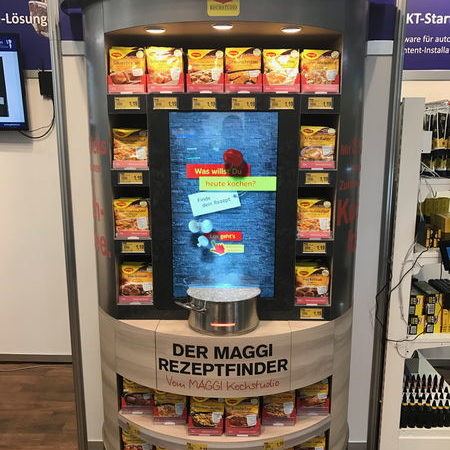Original POS media for the non-alcoholic segment by Kofola attracts both children and adults
From mid-September, shoppers can meet the new POS displays we have prepared for them in cooperation with the Kofola company at the sales areas of the Albert and Globus chains. Both Ondrášovka and Korunní are gaining attention in Globus hypermarkets as part of the...
Take a peek behind the scenes at DAGO and have fun with us
We are busy with work and preparing one exhibition after another. Quality work is a priority for us, but we consider relations between colleagues and a pleasant atmosphere to be equally important. We are all for fun and in between our duties we manage to have a good...
Unique coffee modules start the collaboration between J.J.Darboven and the Pekárna Martin chain.
At the beginning of the unique project, the idea was to equip the Pekárna Martin bakeries with modules for the range of coffees that the J.J.Darboven company has in its portfolio. It then approached us with the first assignment, which started a relatively long,...
We were there when the rum novelty Ron de Azur originated
For our long-term client STOCK Plzeň-Božkov, we prepared a set of POP media for the launch of a Panamanian rum called Ron de Azur. At first glance, it is clear that the design of POS materials provides customers with much more than just information about the product....
We came with gold and silver from the competition SHOP! Awards Paris 2023
On Thursday, June 15th, the SHOP! Awards Paris ceremony took place at a Gala Evening in Paris, formerly POPAI Awards Paris. Our nominated projects – both registered as realizations made of cardboard – were evaluated by the expert jury as follows: the gold was awarded...
The new premium lager Krušovice Bohém enters the stores spectacularly
Heineken Česká republika, a.s. is coming to the traditionally strong beer market with a new product, the premium lager Krušovice Bohém. From its name itself, it is clear that the solution to the presentation of the brand on the sales floor required creativity and...
Royal Crown Cola attracts the atmosphere of South America for refreshment and competition
In cooperation with Kofola a.s. we have prepared POS carriers for Royal Crown Cola in the Albert and Globus stores, which will allow shoppers to enjoy the peace and quietness of South America. Transferring yourself across the ocean is possible not only thanks to the...
The Slovak soft drink market will be enriched by a new product from Rajec Valley
DAGO in cooperation with Kofola a.s. breathes life into new products of the Rajec spring water brand in sales areas. Traditional Slovak herbs – sweet and sour Sea Buckthorn, delicious Marigold, and refreshing Mint – have been combined with real tea and bring an even...
DAGO displays received two nominations for the SHOP! France Awards 2023
In this year's prestigious SHOP! France Awards (previously POPAI Awards Paris) we have two champions. There were nominated the Sensodyne Nourish shop-in-shop in the Health and Pharmaceuticals Category (cardboard POS) and the Christmas pallet display of Pilsner Urquell...
Radegast attracts by bitterness as well as light and sound effects. The new activation will hit the human senses
Already since January customers can see Radegast beer's new activations produced by Dago in cooperation with Plzeňský Prazdroj. For the production of a set of POS materials, several innovative elements were used so that the beer brand originating from Nošovice...
Modern shopping – El Dorado of adventures and sci-fi helpers

This year´s retail Trade Fair EuroShop showed that shopping is not just about getting goods anymore. Experiences customers are getting from a physical contact with a brand and products become the key role of shopping with more and more obvious ubiquity of modern technologies. An experiential shopping is today´s phenomenon associated with the generation change of the purchasing power. Surprising people and wow effects are becoming essential parts of a modern store as they can exceed customer´s expectations and fix an essence of brands in their hearts through analog and digital channels. Today´s stores, therefore, do not manage with simply exposing goods. Brands must try to make customers to enjoy spending their time nearby, offer them experiences, adventure, pamper them, expand their knowledge or refine their taste, offer them things they would not imagine themselves, thanks to which they enjoy something new or otherwise improve their lives.
In connection with the incredible selection on the Internet, which people have available all the time through their smartphones, stone stores must also change into a place of expert consultations. Shop assistants, as experts, will help with selection, expand the possibility of customer´s needs and become customer´s guide in their world of a relevant product inspiration. In this context, there is coming in a new phenomenon of curated shopping based on detecting and meaningfully satisfying existing and potential needs of customers. In connection with the incredible selection on the Internet, which people have available all the time through their smartphones, stone stores must also change into a place of expert consultations. Shop assistants, as experts, will help with selection, expand the possibility of customer´s needs and become customer´s guide in their world of a relevant product inspiration. In this context, there is coming in a new phenomenon of curated shopping based on detecting and meaningfully satisfying existing and potential needs of customers.

 SK
SK


